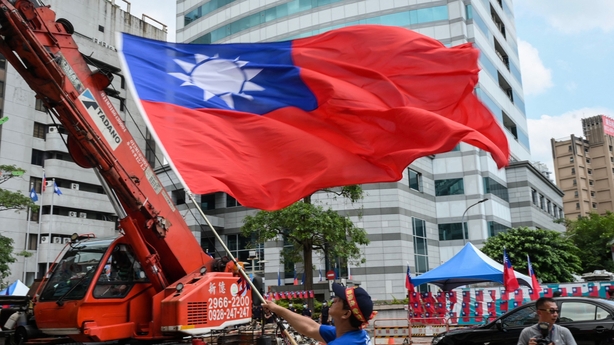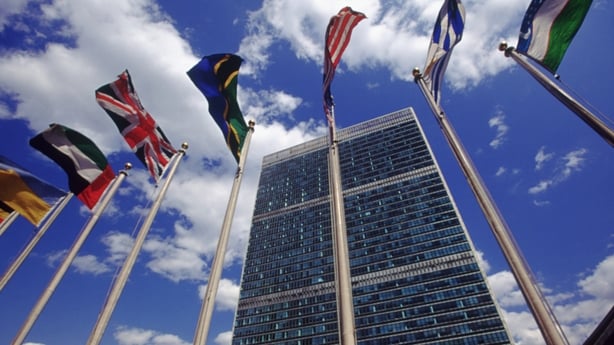Taiwan’s diplomatic allies have presented a letter to the UN Secretary-General calling for Taiwan to be given the right to participate in the international body.
The letter, co-signed by ten UN member states, urged the UN to address the "unjustified exclusion of Taiwan’s 23.5 million people" and to end the UN’s "discriminatory policy" against Taiwanese citizens.
China claims the self-ruling democracy as part of its own territory, which it reserves the right to take by force.
Beijing blocks Taiwan’s participation across UN agencies and Taiwanese passport holders are not permitted to enter UN buildings.
Outside the entrance to the UN headquarters in New York, ambassadors from Guatemala, Saint Vincent and the Grenadines, Tuvalu, and Belize, flanked by representatives from Taiwan’s Economic and Cultural Office, gathered to reaffirm their support for Taiwan’s participation.
"We stand before you, ensuring that you know that Taiwan is not alone," Inga Rhonda King, Ambassador of Saint Vincent and the Grenadines, told reporters.

It has become an annual ritual for Taiwan’s allies to write to the Secretary-General, protesting Taiwan’s exclusion.
But their numbers have dwindled over the years, as more and more member states have switched diplomatic recognition from Taipei to Beijing.
Honduras was the most recent departure from Taiwan’s diplomatic tally, making the switch in March this year, preceded by Nicaragua in 2021 and Kiribati and Solomon Islands in 2019.
Now just 14 UN member states officially recognise Taiwan. Although, most countries, including Ireland, maintain informal and trade ties.
Asked by RTÉ News if it felt like an increasingly lonely position, the envoy from Belize said that it was a concern that fewer countries were expressing their support publicly.
"I do believe they are still supporting them in the background," Ambassador Carlos Fuller told RTÉ News. "But they may not want to voice it as vocally as we are doing today."
"When you are on the right side of history and principle, you focus on the principle," Ambassador King of Saint Vincent and the Grenadines said.
"Our voices, small though they may be, tiny countries though we may be," she added. "We stand on the side of principle."
Yesterday’s letter from the envoys to the Secretary-General stated that Taiwan’s exclusion from the UN was based on a misrepresentation of a UN General Assembly resolution.
Resolution 2758, passed in 1971, re-assigned China’s seat to the communist government in Beijing and ejected the representatives of Chiang Kai-Shek, based in Taipei.

But Taiwan’s allies inside the UN said that the resolution made no mention of Taiwan and was not designed to leave the people of Taiwan without representation in the global body.
"We are very concerned that a country like Taiwan cannot have its voices heard within the UN system," Ambassador Fuller of Belize told reporters.
"Who else will speak on behalf of the 23 million Taiwanese citizens on the island?" he said.
China’s mission to the UN did not return a request for comment yesterday.
But ahead of last month’s UN General Assembly, China’s Ambassador to the UN, Zhang Jun said "the so-called Taiwan's participation in the UN" was "a false narrative through and through".
"There is but one China in the world, and Taiwan is an inalienable part of China's territory," Ambassador Zhang said.
His remarks were in response to comments by the UN’s Deputy Secretary-General, Amina Mohammed, who said that "the exclusion of anyone holds back" the UN’s Sustainable Development Goals – the UN’s blueprint to improve lives and protect the planet.
"We said leave no one behind and I think member states have to find a way to make sure that we are not in that position where we're excluding people," Ms Mohammed told reporters.
"Every person matters, whether it’s Taiwan or otherwise," she added.
At yesterday’s news conference, Taiwan’s diplomatic allies referenced the Deputy Secretary-General’s remarks.
"The United Nations Charter starts off with the words: 'we the people’," Ambassador Tapugao Falefou of Tuvalu told reporters.
"If we are to be true to the lessons of the UN Charter, we have to make sure that we do not leave anyone behind," he added.
Asked by RTÉ News if they have been put under pressure by China to switch their allegiance from Taipei to Beijing, the envoy from Guatemala said pressure came from several sides, "especially big countries".
"But we stay fighting nationally, regionally and internationally for freedoms," Ambassador Carla Rodriguez told RTÉ News.
"Taiwan is a democracy and a country of freedom," she added, "so we stand behind them".







